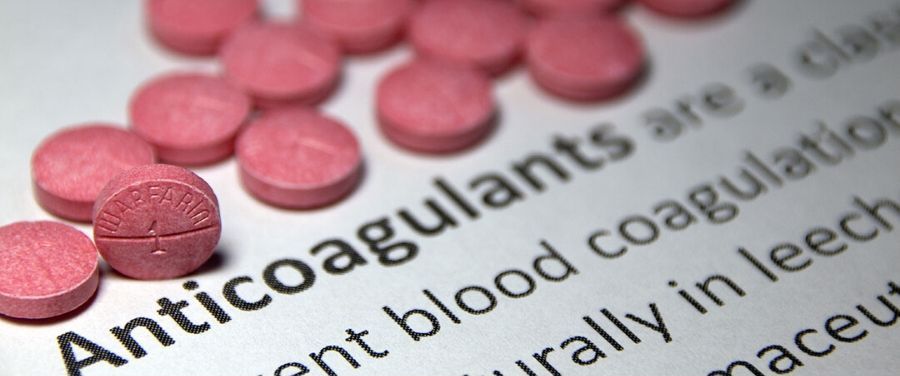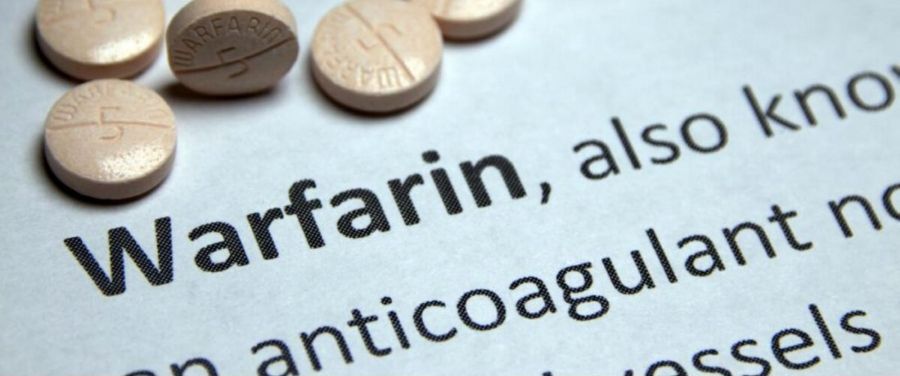GENERIC NAME(S)— Warfarin
BRAND NAME(S)— Coumadin, Jantoven
DRUG CLASS— Anticoagulants or Blood Thinners
What Is Warfarin?
Warfarin is a medication that is used as a blood thinner or anticoagulant. It is used to treat blood clots such as deep vein thrombosis, pulmonary embolism, and to prevent stroke in the individuals who have atrial fibrillation (irregular heartbeat), valvular heart disease or artificial heart valves. It is taken by mouth and sometimes also used by injection into a vein.
Warfarin first came into the commercial use in 1948 as a rat poison. It was approved for medical use in 1954 in the United States. (1)
Interactions:
It is very important to ask your doctor before you start or stop taking any other medicine, especially (1) (2) (3) —
- St. John’s wort
- Fish Oil
- Coenzyme Q10 (CoQ10)
- Nonsteroidal anti-inflammatory drugs (NSAIDs)
- Antibiotics, such as metronidazole or the macrolides
- Broad-spectrum antibiotics
- Other medicines to prevent blood clots
- Starflower oil
- Supplements that contain vitamin K
- Cranberry, echinacea, garlic, ginkgo biloba, ginseng, goldenseal
Precautions:
You should not use this medicine if you are allergic to it, or if —
- You have high blood pressure
- You recently had a surgery on your brain, spine, or eye
- You undergo a spinal tap or spinal anesthesia
Avoid taking warfarin if you are prone to bleeding because of a medical condition, especially —
- Bleeding in the brain
- An infection of the lining of your heart
- A blood cell disorder (such as low red blood cells or low platelets)
- Ulcers or bleeding in the stomach, lungs, urinary tract or intestines
Tell your health care provider if you have ever had —
- Diabetes
- Liver disease
- Kidney disease
- Congestive heart failure
- A hereditary clotting deficiency
- Low blood platelets after receiving heparin
Do not take this medication if you are pregnant. It can cause many birth defects. Consult your doctor once before taking this medicine.
Very small amounts of warfarin may pass into the breast milk but is unlikely to harm a nursing infant. Ask your health care provider before breast—feeding. (2)
What Should I Avoid While Using Warfarin?

Foods that are high in vitamin K such as leafy green vegetables, liver or vegetable oils can make warfarin less effective. If these foods are the part of your daily diet routine, consume a consistent amount on a weekly basis. Also avoid making any change in your diet. Ask your doctor for more details.
Pomegranate juice, cranberry juice, noni juice and grapefruit juice may interact with the medication and cause many side effects. Avoid drinking alcohol.
Ask your doctor or health care provider before using any medicine for arthritis, fever, pain or swelling such as ibuprofen (Advil, Motrin), aspirin, naproxen (Aleve), diclofenac, indomethacin, celecoxib (Celebrex), meloxicam and others. These medicines may increase the risk of stomach bleeding.
It is advisable to avoid activities that may increase the risk of bleeding or injury.
What Are The Side Effects Of Warfarin?
Call your doctor or health care provider if you have any signs of bleeding such as (1) (2) (3) —
- Dizziness
- Weakness
- Pain
- Swelling
- Sudden headache
- Unusual bruising
- Blood in the urine and stools
- Bleeding gums, nosebleeds
- Bleeding from wounds
- Blood while coughing
- Heavy menstrual periods or abnormal vaginal bleeding
Get medical help if you have —
- Pain
- Swelling
- Skin changes
- Foot ulcer
- Purple toes or fingers
- Hot or cold feeling
- Discoloration anywhere on your body
- Sudden and severe leg or foot pain
What Happens If I Miss A Dose Of Warfarin?
Take the missed dose as soon as you remember. Skip the missed dose if it is almost the time for your next scheduled dose. Do not take extra medicine to make up the missed dose.
What Happens If I Overdose?
Warfarin overdose can cause excessive bleeding. Seek emergency medical help or call the Poison Help line at 1—800—222—1222.
RELATED ARTICLES:
